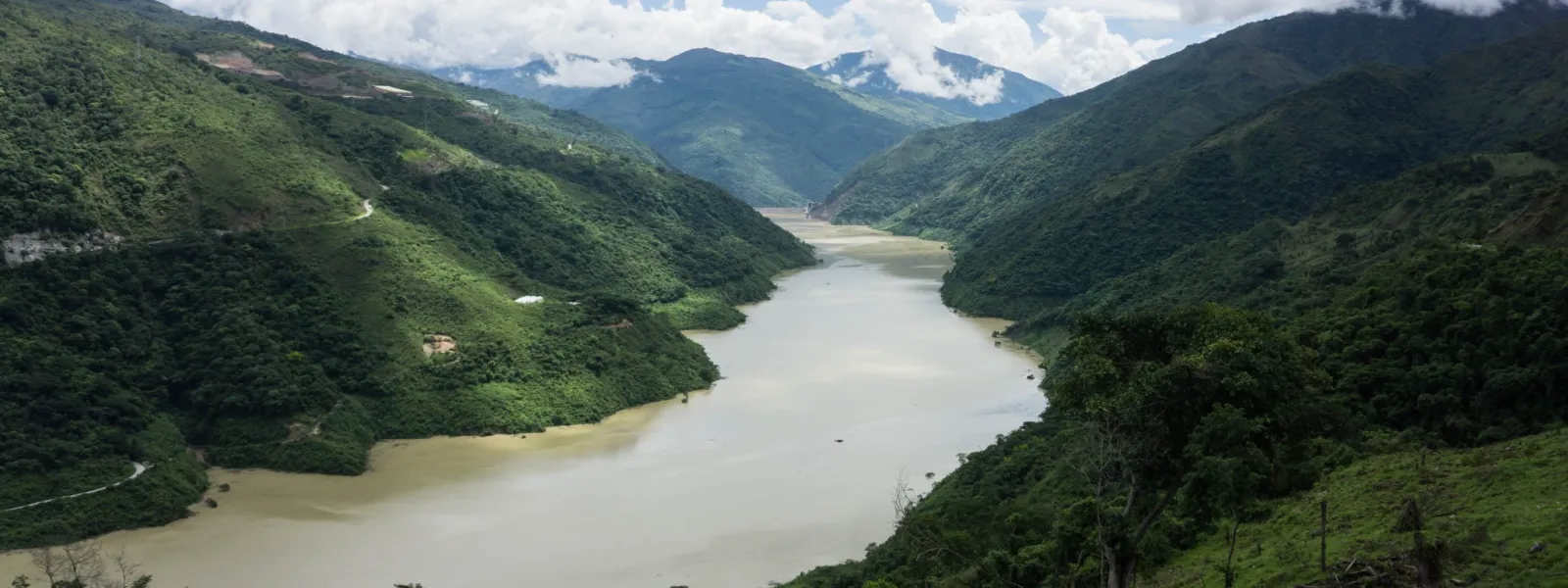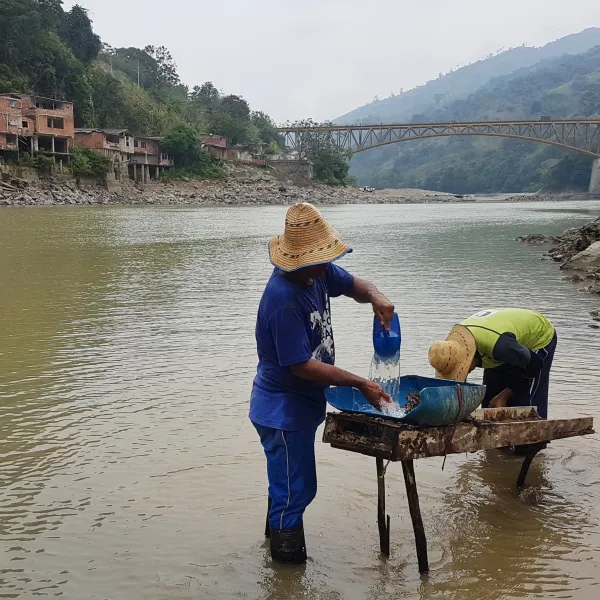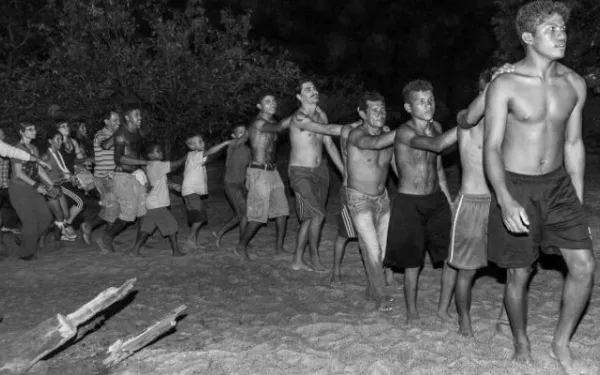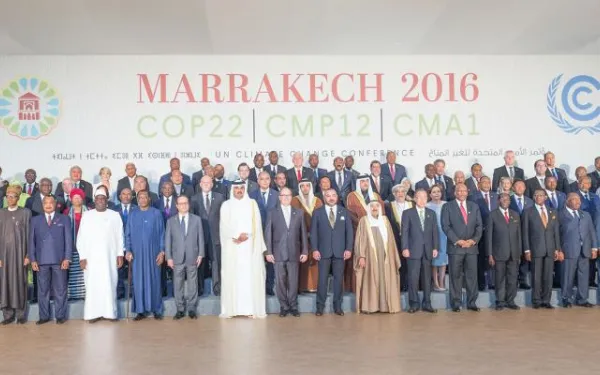
Project
Bram EbusSeeking justice for communities affected by the Hidroituango dam
The Cauca River is the second largest in Colombia. Many of the communities settled throughout its expansive watershed depend on the river for their livelihood, includingd fishing and agriculture.
Winding its way through the Andes mountains, the river courses through seven departments of Colombia, including Antioquia, now home to the Hidroituango Dam—a project that has created an unprecedented humanitarian crisis.
In May of 2018, an error in the dam’s construction caused floods, landslides, avalanches, and the evacuation of more than 25 thousand people. This tragedy exposed the inadequate evaluation of the project’s environmental impacts and the lack of environmental regulation in the dam’s authorization processes.
The project has led to systematic human rights violations, including the disproportionate use of force and an increase in violence against affected communities, who are represented by the Ríos Vivos (“Living Rivers”) Movement of Colombia.
Though construction is not complete, and electricity has not yet been generated, the dam has flooded more than 4,500 hectares of vegetation, releasing a significant amount of methane—a greenhouse gas that aggravates the global climate crisis.
And despite its inadequate implementation, IDB Invest, a private branch of the Inter-American Development Bank, invested millions of dollars into the hydroelectric project and facilitated the investment of billions more from other international banks.
Communities affected by Hidroituango have spent decades denouncing the serious problems caused by the dam, and will not waver in their struggle to defend their land and water.
Partners:

Related projects

In the Hamlet of Mïratu, the Juruna mourn the death of Jarliel
By Marcelo Salazar, Instituto Socioambiental (ISA) AIDA translation of a blog originally published by ISA Jarliel died while diving for fish in water 25 meters deep. One of his brothers blames the Belo Monte Dam, which pushed all the fish into deeper waters, forcing fishermen to follow. Before the dam, fish were plentiful in the waterfalls and shallows of the river. Jarliel Juruna, known as Jarla, died on October 26, 2016 while diving for brown acari, a common Amazonian catfish. He was 20 years old. Jarliel was roughly 25 meters deep when he stopped breathing; his lifeless body floated to the surface. It was a tragedy for Mïratu, in the Paquiçamba indigenous territory; it was a tragedy for the Juruna people* of the Volta Grande; and it was a tragedy for the Xingu River, in the Brazilian Amazon. He left his parents, siblings, wife, and newborn son, all in shock. They had no idea where to go or what to do next. In near total silence, Giliarde Juruna, chief of Mïratu and one of Jarliel’s brothers, kept his gaze fixed on the forest behind the straw house that holds the community kitchen. Another brother, Jair Juruna, known as Negão, was outraged: "We’ve never had to fish acari in such deep waters. But because of the dam, the fish that have always been right here, in the waterfalls and in the shallows, have disappeared. And we have families to support. Norte Energía [the dam-building consortium] is playing with our lives. Where are the productive projects? If things were working, we would have other jobs and we wouldn’t need to risk our lives to support our families. Now look what’s happened." On the other side of the continent, Bel Juruna was in Peru representing her people in a meeting of Latin American indigenous leaders. She was speaking about the violence that the Belo Monte operators brought to her community and the people of the Xingu. When she heard the news, she was devastated. She wasn’t able get home in time to attend Jarliel’s burial; to say goodbye to her youngest brother, whom she had helped to raise. Jarla was a happy and playful young man, dedicated, completing his high school degree and dreaming of college. He was one of his village’s fighters, present in many of the peaceful occupations of the Belo Monte Dam complex, fighting for the rights of the indigenous people of the Xingu. One day, the full story behind Belo Monte will be told. The very real impacts the dam has had on the life of the people of the Xingu will be recognized. May Jarla now join the great Mïratu fighters on another plane—and unite his efforts with those who remain on Earth to fight against Belo Monte and against other forms of destruction of the indigenous and traditional communities of the Xingu. *Proprietors of the River The Yudja, or Juruna (as they’re know in the region), live on the islands and banks of the Xingu. They are known as “proprietors of the river” for their great ancestral knowledge of its flow, and for having migrated for centuries from the mouth of the Xingu to its headwaters. Mïratu, one of the villages in Paquiçamba indigenous territory, sits roughly 10 km below one of Belo Monte’s reservoirs. The hamlet suffers various impacts from the dam, including changes in their traditional fisheries. In collaboration with (the?) Universidad Federal do Pará and ISA, and with the support of the Mott Foundation, the Juruna people are engaged in independent monitoring of their fisheries, which reveals the damages suffered in recent years. Jariel was one of the monitors in Mïratu.
Read more
Climate finance advances, but lacks ambition
The 22nd Conference of the Parties to the United Nations Framework Convention on Climate Change (COP22) was held in Morocco from November 7-18, 2016. The delegates made progress on issues related to finance for developing countries facing the impacts of climate change. But their decisions needed to be more ambitious. Global governments must provide adequate and predictable financial contributions so countries can plan and execute adaptation and mitigation strategies. COP22 was the first climate conference held after the Paris Agreement became binding on November 4. In Marrakech, signatory countries began to establish procedures to implement the new global accord. “The meeting sent a strong political message to the world: the commitments established under the Paris Agreement will stand above the results of the US presidential elections, whose winner has denied the very existence of climate change,” said Andrea Rodriguez, AIDA attorney and civil society participant in the climate negotiations. Funding the fight against climate change Important progress was made at COP22 in terms of climate finance, a key component in the global fight against climate change. Developing countries presented a roadmap for mobilizing $100 billion per year by 2020, a commitment made in the Paris Agreement. Although the plan is valid, the contributions of developed nations must be even more ambitious to achieve the financial target and ensure that economic resources will be available when required. Important recommendations were made to the Green Climate Fund—the largest fund for climate adaptation and mitigation. They focused on increasing direct access to funding and simplifying the process of accessing funds. But the recommendations did not, as hoped, focus on helping to develop and implement climate plans agreed under the Convention (such as Nationally Appropriate Mitigation Actions, National Adaptation Programs of Action, and Intended Nationally Determined Contributions). Together with our allies, AIDA organized two side events to share views on progress made in the Green Climate Fund, from the perspective of several actors involved in the process. The panelists emphasized the need to strengthen national governments’ capacities to plan and design funding proposals based on each country’s priority needs. Such increased capacity would allow developing countries not to rely on outside entities to make decisions with far-reaching consequences for the environment and national economies. Emphasis was also placed on the importance of including non-governmental actors in decisions about how to use climate finance, so more comprehensive and legitimate proposals can be produced. The event educated a wide variety of participants from organizations and governments, and provided an opportunity for them to exchange views with the Secretariat and with Accredited Entities on ways to improve processes ahead. The fate of the Adaptation Fund, which was created under the Kyoto Protocol to support adaptation activities in developing countries, was uncertain throughout the two weeks of COP22 negotiations. Fortunately, Parties decided that the Adaptation Fund will also serve to implement the Paris Agreement. Its continuity was guaranteed thanks to an infusion of $81 million from four developed nations (Germany, Belgium, Italy and Sweden). In terms of long-term financing, Parties decided to prioritize the mobilization of public resources and guarantee financial support for adaptation actions, with greater participation of the private sector. We were also hoping the Parties would make new financial commitments for the post-2020 period, but this did not happen.
Read more
Now, more than ever, it’s time to work for our planet
The results of the United States election have shocked the world. Many of us feel hurt, angry and, above all, worried. For those of us who work to protect our planet and our shared environment a Trump presidency is deeply troubling. The president-elect has called climate change a hoax and promised to back out of the Paris Agreement, to dismantle President Obama’s Clean Power Plan, and to rebuild the coal industry. In the challenging years ahead, the movement to protect Earth will be more important than ever. We must all be a part of it. Today, more than ever, we reiterate our commitment to justice—for the environment and for all those whose lives depend so intimately on it. Now is the time to act. The world needs leadership, ours and yours. Each one of us at AIDA is committed to making our planet a better place to live. We are dedicated to defending it from destructive climate policies, and to uplifting its most vulnerable populations. We know what’s coming will be difficult. That’s why your support is so important. Coming together now is imperative. We have a historic responsibility to demonstrate leadership, to find peaceful solutions, and to ensure a brighter future for present and future generations. We must react with unity, engage, and collaborate. It’s time to build hope and lay the path to a peaceful, prosperous, respectful, and tolerant future. With our valued supporters and partners, AIDA will keep working to protect the Earth, its defenders, their culture, and their way of life.
Read more